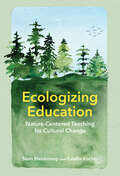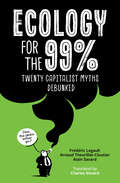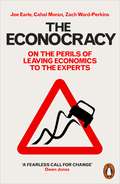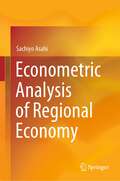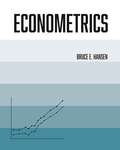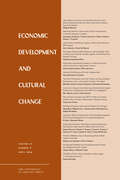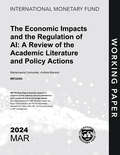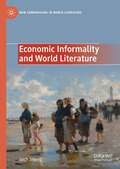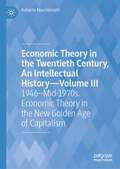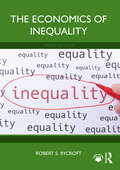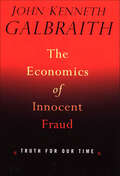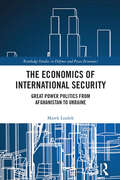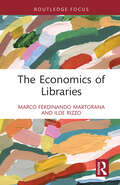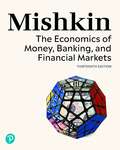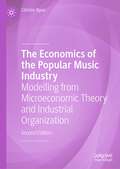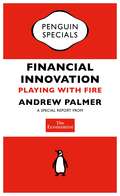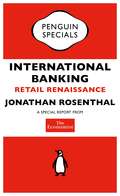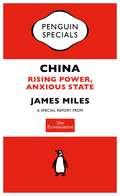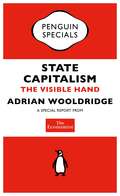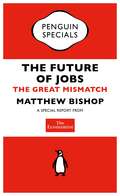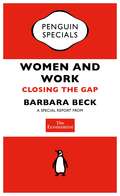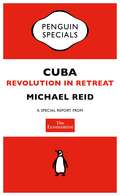- Table View
- List View
Ecologizing Education: Nature-Centered Teaching for Cultural Change
by Sean Blenkinsop Estella C. KuchtaEcologizing Education explores how we can reenvision education to meet the demands of an unjust and rapidly changing world. Going beyond "green" schooling programs that aim only to shape behavior, Sean Blenkinsop and Estella Kuchta advance a pedagogical approach that seeks to instills eco-conscious and socially just change at the cultural level. Ecologizing education, as this approach is called, involves identifying and working to overcome anti-ecological features of contemporary education. This approach, called ecologizing education, aims to develop a classroom culture in sync with the more-than-human world where diversity and interdependency are intrinsic.Blenkinsop and Kuchta illustrate this educational paradigm shift through the real-world stories of two public elementary schools located in British Columbia. They show that this approach to learning starts with recognizing the environmental and social injustices that pervade our industrialized societies. By documenting how ecologizing education helps children create new relationships with the natural world and move toward mutual healing, Blenkinsop and Kuchta offer a roadmap for what may be the most potent chance we have at meaningful change in the face of myriad climate crises. Timely, practical, and ultimately inspirational, Ecologizing Education is vital reading for any parent, caregiver, environmentalist, or educator looking for wholistic education that places nature and the environment front and center.
Ecology for the 99%: Twenty Capitalist Myths Debunked
by Frédéric Legault Arnaud Theurillat-Cloutier Alain SavardIf everyone—from Emmanuel Macron to Jeff Bezos, and even Coca Cola—is green, why is the environmental crisis growing at an alarmingly rapid rate? The world is already experiencing the impact of climate crisis, but we are not equally responsible for its violent effects. Some of those who claim to be helping the planet are actually making things worse. To avoid being duped by false allies and to create an ecology for the 99%, we must discuss a radical topic: the exit from capitalism. Ecology for the 99% provides inspiration for building grassroots environmental movements through a lively discussion of the most persistent capitalist myths. It presents compelling evidence for why carbon market policies will fail, why a capitalist economy cannot be based on renewable energy sources, and why we should be protesting against overproduction, not overconsumption. Ecology for the 99% is an antidote to apathy and a bulwark against false leads. Time is running out, we can’t afford to take any wrong turns.
Ecology of Wildlife Diseases in the Neotropics
by Gerardo Acosta-Jamett Andrea ChavesThis contributed volume focuses on the Neotropical region, and explores the environmental, ecological and socio-economic components that facilitate the emergence of zoonotic diseases. This book highlights the primary ecological, environmental, social, and economic variables associated with the risk of maintenance, transmission, and dissemination of emerging, re-emerging, and neglected infectious diseases, in which Neotropical vertebrates are involved. It compiles up-to-date knowledge and research for the neotropical region, as well as discusses the current needs of knowledge improvement. The chapters include various examples of the cycles of infectious diseases, all with world-wide relevance where neotropical wild vertebrates are affected or involved.
The Econocracy: On the Perils of Leaving Economics to the Experts
by Joe Earle Cahal Moran Zach Ward-PerkinsA century ago, the idea of 'the economy' didn't exist. Now economics is the supreme ideology of our time, with its own rules and language. The trouble is, most of us can't speak it. This is damaging democracy. Dangerous agendas are hidden inside mathematical wrappers; controversial policies are presented as 'proven' by the models of economic 'science'. Government is being turned over to a publicly unaccountable technocratic elite. The Econocracy reveals that economics is too important to be left to the economists - and shows us how we can begin to participate more fully in the decisions which affect all our futures.
Econometric Analysis of Regional Economy
by Sachiyo AsahiThis book provides readers with an analysis of econometric methods using statistical information to examine actual aspects of Japan's regional economy. Beginning with ways of ascertaining the economy of a region's production factors, the book describes methods for creating new data using various regional statistical data that link regions within prefectures.The topics addressed here are some of the most pressing issues in Japan's regional economy. These include economic ripple effects due to social capital and public investment, economic evaluation of the environment for sustainable growth, the impacts of overtourism congestion phenomenon, and the measurement of the total fertility rate of female employees in industry.The book provides a way to comprehend the actual conditions of Japan's regions and the level of regional economic sectoral effects and regional externalities—an analytical method to obtain the information required for policy making. Combining socially related fields on a wide range of issues in Japan’s regional economy, the detailed studies are aimed especially at researchers and policymakers working on econometric analysis research based on economic theory.
Econometrics
by Bruce HansenEconometrics is the quantitative language of economic theory, analysis, and empirical work, and it has become a cornerstone of graduate economics programs. Econometrics provides graduate and PhD students with an essential introduction to this foundational subject in economics and serves as an invaluable reference for researchers and practitioners. This comprehensive textbook teaches fundamental concepts, emphasizes modern, real-world applications, and gives students an intuitive understanding of econometrics. Covers the full breadth of econometric theory and methods with mathematical rigor while emphasizing intuitive explanations that are accessible to students of all backgrounds Draws on integrated, research-level datasets, provided on an accompanying website Discusses linear econometrics, time series, panel data, nonparametric methods, nonlinear econometric models, and modern machine learning Features hundreds of exercises that enable students to learn by doing Includes in-depth appendices on matrix algebra and useful inequalities and a wealth of real-world examples Can serve as a core textbook for a first-year PhD course in econometrics and as a follow-up to Bruce E. Hansen’s Probability and Statistics for Economists
Economic Development and Cultural Change, volume 72 number 3 (April 2024)
by Economic Development and Cultural ChangeThis is volume 72 issue 3 of Economic Development and Cultural Change. Economic Development and Cultural Change (EDCC) publishes studies that use modern theoretical and empirical approaches to examine both the determinants and the effects of various dimensions of economic development and cultural change. EDCC’s focus is on empirical papers with analytic underpinnings, concentrating on microlevel evidence, that use appropriate data to test theoretical models and explore policy impacts related to economic development.
The Economic Impacts and the Regulation of AI: A Review of the Academic Literature and Policy Actions
by ManeraA report from the International Monetary Fund.
Economic Informality and World Literature (New Comparisons in World Literature)
by Josh JewellThis book analyses the impact of economic informality on the novel form across the modern world-system, looking specifically at works by Antonio de Almeida, Machado de Assis, Dany Laferrière, Ngũgĩ wa Thiong’o, Nadine Gordimer, and Masande Ntshanga. It sees the representation of informal economies as a structural homology of world-literature. In chapters on the figure of the agregado in the nineteenth-century Brazilian novel; sex work in Haitian fiction; the politics of the informal economy in the post-apartheid South African novel; and Ngugi’s representation African occult economies, Josh Jewell explores the relationship between the rise of improvised economic activity—and its consolidation under neoliberalism in postcolonial nations—and literary form. He shows how informal economies can be grasped as locations of strategy and improvisation whose subjects must shift constantly between officialdom and underground networks; between the realms of the licit and illicit. This produces highly heterogenous narratives oscillating between different tones and registers (unserious and tragic), social spaces (working-class and elite), and conceptions of reality. By comparing the various situated aesthetics of informality, this book instrumentalises the Warwick Research Collective’s compelling but nebulous idea of a world-literature that “variously registers” a “singular modernity”.
Economic Theory in the Twentieth Century, An Intellectual History—Volume III: 1946–Mid-1970s. Economic Theory in the New Golden Age of Capitalism
by Roberto MarchionattiThis book, set out over four-volumes, provides a comprehensive history of economic thought in the 20th century. Special attention is given to the cultural and historical background behind the development of economic theories, the leading or the peripheral research communities and their interactions, and a critical appreciation and assessment of economic theories throughout these times.Volume III addresses economic theory in the period of the new golden age of capitalism, between the years from the end of the Second World War to the mid1970s, which saw the establishment of the new mainstream, in particular in its Harvard-MIT-Cowles version. It was the period of the pre-eminence of the Neoclassical Keynesian Synthesis—the theoretical core of the period’s dominant school of thought.This work provides a significant and original contribution to the history of economic thought and gives insight to the thinking of some of themajor international figures in economics. It will appeal to students, scholars and the more informed reader wishing to further their understanding of the history of the discipline.
The Economics of Inequality
by Robert S. RycroftIf there was any question before, there is no longer a question today: inequality, discrimination, poverty, and mobility are prominent national issues. The notion of "The American Dream" has been sold to generations of young Americans as the idea that working hard and following your dreams will allow you to break through any barriers in your path and inevitably lead to success. However, recent findings on inequality, discrimination, poverty, and mobility show that "The American Reality" is very different.The third edition of this introductory-level text has been completely revised to bring students up to date with current economic thinking on these issues. With an emphasis on data, theory, and policy, this book tackles each issue by exploring three key questions in each chapter: What does the data tell us about what has been happening to the American economy? What are the economic theories needed to understand what has been happening? What are the policy ideas and controversies associated with these economic problems?Key controversies are highlighted in each chapter to drive classroom discussion, and end-of-chapter questions develop student understanding. The book will also be accompanied by digital supplements in the form of PowerPoint slides for each chapter. This clearly written text is ideally suited to a wide variety of courses on contemporary economic conditions, inequality, and social economics in the United States.
The Economics of Innocent Fraud: Truth For Our Time
by John Kenneth GalbraithJohn Kenneth Galbraith has long been at the center of American economics, in key positions of responsibility during the New Deal, World War II, and since, guiding policy and debate. His trenchant new book distills this lifetime of experience in the public and private sectors; it is a scathing critique of matters as they stand today.Sounding the alarm about the increasing gap between reality and "conventional wisdom" -- a phrase he coined -- Galbraith tells, along with much else, how we have reached a point where the private sector has unprecedented control over the public sector. We have given ourselves over to self-serving belief and "contrived nonsense" or, more simply, fraud. This has come at the expense of the economy, effective government, and the business world.Particularly noted is the central power of the corporation and the shift in authority from shareholders and board members to management. In an intense exercise of fraud, the pretense of shareholder power is still maintained, even with the immediate participants. In fact, because of the scale and complexity of the modern corporation, decisive power must go to management. From management and its own inevitable self-interest, power extends deeply into government -- the so-called public sector. This is particularly and dangerously the case in such matters as military policy, the environment, and, needless to say, taxation. Nevertheless, there remains the firm reference to the public sector.How can fraud be innocent? In his inimitable style, Galbraith offers the answer. His taut, wry, and severe comment is essential reading for everyone who cares about America's future. This book is especially relevant in an election year, but it deeply concerns the much longer future.
The Economics of International Security: Great Power Politics from Afghanistan to Ukraine (Routledge Studies in Defence and Peace Economics)
by Marek LoužekInternational relations since the end of the Cold War have been relatively uneasy, yet we should not discount the fact that the intensity of conflicts has decreased compared to the situation in both the first and second halves of the 20th century. This book explores international security relations as the pandemic subsides and the war in Ukraine escalates, offering a good description of the main actors and the background of current threats.It lays the theoretical foundations for security economics, analyses U.S. foreign policy, introduces China as a new superpower and signals Russia as a great power in decline. It concludes by pointing out the pitfalls of exporting democracy and presenting the paradox of progress. The author asserts that we should not be alarmed that international relations are shifting. Following the Cold War, the U.S. achieved clear strategic and economic superiority, however, China, Russia, India and other great powers remain strong players that must be taken seriously.The book shows that asymmetric warfare often ends with the weaker side winning and the stronger one losing and being discredited. Different examples of this outcome include the American War in Vietnam (1965-73), the Soviet Union's defeat in Afghanistan (1979-1990), and the U.S. getting mired in the wars of Afghanistan and Iraq. The war in Ukraine is a demonstration of the illusion of an imperial power that believes it can impose its will on other nations, even against their will.The book will be a useful resource for academics, students and researchers, as well as policymakers and professionals interested in issues related to international security and defense.
The Economics of Libraries (Routledge Research in the Creative and Cultural Industries)
by Marco Ferdinando Martorana Ilde RizzoLibraries are included in the widely accepted definition of Cultural and Creative Industries, together with heritage, performing arts, museums, visual arts, and archives, and they play an important role in the creative value chain. The Economics of Libraries highlights the economic importance of the library sector.Providing an accessible and concise expert overview of the most important economic features and diversified functions of libraries, the authors also summarise the challenges and opportunities deriving from digital technologies, the management of cultural infrastructures, and audience development. This unique short-form book fills a longstanding gap in our understanding of the demand and supply of library services.This book will be of interest to researchers and scholars in the fields of economics and the creative and cultural industries. It also provides useful insights for students and lecturers, as well as topics of discussion for professionals.
The Economics of Money, Banking, and Financial Markets
by Frederic S MishkinThe Economics of Money, Banking and Financial Markets, 13th Edition brings a fresh perspective to today's major questions surrounding financial policy. Influenced by his term as Governor of the Federal Reserve, Frederic Mishkin provides a unique viewpoint and informed insight into the monetary policy process, the regulation and supervision of the financial system, and the internationalization of financial markets.
The Economics of the Popular Music Industry: Modelling from Microeconomic Theory and Industrial Organization
by Christie ByunThis book uses economic theory to explain how consumers and producers have responded to major changes in the music industry. Byun examines the important role of technology in changing its structure, particularly as new methods of creating and accessing music prove to be a double-edged sword for creators and producers. This second edition includes new information about concert attendance and live performance in the COVID era and what followed, as well as the resultant economic impacts on the industry. Throughout the book, Byun questions how the business of music affects creativity and the extent to which this impacts the creative output of the individual artist. Chapters also address copyright enforcement and online piracy. This is an approachable resource for economists interested in the music industry as well as business and music majors studying the ways in which technology can impact a creative process.
The Economist: Playing with Fire (Penguin Specials)
by The Economist Publications (PUK Rights)The Penguin Economist Special reports delve into the most pressing economic issues of the day: from national and global economies, to the impact of trade, industry and jobs. Written to be read on a long commute or in your lunch hour - be better informed in under an hour.Is financial innovation good or bad?Did it cause the financial crisis of 2007/2008?Are the current financial systems working for a stable global economy?Andrew Palmer answers these questions in his special report, but urges that it's more that just a debate on whether financial innovation does or doesn't work. In fact, he claims, it is almost impossible to draw these distinctions.Using a variety of examples - from social bonds to securitisations risks - he highlights the weaknesses in innovative strategies, revealing how some innovation is doomed to failure.The consequences of innovation are now so crucial and so scrutinised - it is essential reading for anyone in the business world.Sections include:Playing with fireThe ferment of financeThe little guyFrom vanilla to rocky roadThe fast and furiousOf plumbing and promisesOn the side of the angelsSafety first
The Economist: Retail Renaissance (Penguin Specials)
by The Economist Publications (PUK Rights)The Penguin Economist Special reports delve into the most pressing economic issues of the day: from national and global economies, to the impact of trade, industry and jobs. Written to be read on a long commute or in your lunch hour - be better informed in under an hour.Retail banking is heading for a revival. With the financial crisis still hanging over Western economies, banks have rejuvenated the retail arm of the business. They are now seen as more stable sources of profit than the risky traders.Technology is both a help and a hindrance. On one hand, online banking is revolutionizing money management. But will this lead to the close of the high street bank? How can banks outstrip the developing tech companies who are offering rival services?This report will assess the challenges and opportunities that banks face in the rich world and the emerging markets. Sections include:Retail renaissanceWithering awayDispatches from the hothouseCrunching the numbersA wealth of walletsOver the sea and far awayPrivate pursuitsWorld, here we come
The Economist: Rising Power, Anxious State (Penguin Specials)
by The Economist Publications (PUK Rights)The Penguin Economist Special reports delve into the most pressing economic issues of the day: from national and global economies, to the impact of trade, industry and jobs. Written to be read on a long commute or in your lunch hour - be better informed in under an hour.'The line up for next year's change of leadership does not give cause for optimism' says James Miles, the Economist's China correspondent.With a heavily state owned banking system, waning numbers of workers in a labour intensive industrial economy and lack of development in new business, China's current boom may be set to bust. In the following sections, James Miles examines the restrictive nature of government in China, and what it will mean for the country and the rest of the world.Urbanisation: Where do you live?Rising power, anxious stateChina's new leaders: The princelings are comingGrowth prospects: Beware the middle-income trapDeng & CoGovernment's role in industry: The long arm of the stateDemography: Getting onIdeological battles: Universalists v exceptionalists
The Economist: The Visible Hand (Penguin Specials)
by The Economist Publications (PUK Rights)The Penguin Economist Special reports delve into the most pressing economic issues of the day: from national and global economies, to the impact of trade, industry and jobs. Written to be read on a long commute or in your lunch hour - be better informed in under an hour.As Western liberalist capitalism flounders in the wake of global recession, state backed companies are slowly taking over.The melding of the power of the state and the power of capitalism is on the rise. Prevalent in the emerging economies of China, Russia and Brazil, some of the world's most powerful companies are state owned. The 13 biggest oil firms are government controlled. China Mobile has over 600million customers and the Emirates airlines is growing at 20% a year.However, despite the numerous successes, Adrian Wooldridge urges caution. He asks whether it could easily survive if confronted with difficulty, criticises the embedded corruption and cronyism and asks whether a fair trading system is possible to maintain with government favoured business.Slowly but surely, the invisible hand of the market is being usurped by the visible, often authoritarian, hand of state capitalism.Sections include:The visible handSomething old, something new - a brief history of state capitalismNew masters of the universe - how state enterprise is spreadingTheme and variations - state capitalism is not all the sameMixed bag - infrastructure and innovationThe world in their hands - state capitalism looks outward and inwardAnd the winner is - fatal flaws
The Economist: Beyond the PC (Penguin Specials)
by The Economist Publications (PUK Rights)The Penguin Economist Special reports delve into the most pressing economic issues of the day: from national and global economies, to the impact of trade, industry and jobs. Written to be read on a long commute or in your lunch hour - be better informed in under an hour.Twenty years ago one gigabyte of memory cost $200,000. Now, a terabyte (1000 gigabytes) costs a mere $100.Technology permeates our everyday lives and never more so than with our portable, personal devices. Businesses are struggling to keep up with their employees' technological abilities and demands.In Personal Technology, Martin Giles unpicks the changing landscape of technology, examining apps, new devices and their effect on world trade. In the following sections, he explains how technology and the economy are becoming inextricably linked and how this has resulted in the birth of the new, digital age.Beyond the PCConsumerisation: The power of manyApps on tapPersonal technology at work: IT's Arab springAdapting personal IT for business: The consumer-industrial complexDroid warsUbiquitous computing: Up closeTechnology and society: Here comes anyware
The Economist: All the World's a Game (Penguin Specials)
by The Economist Publications (PUK Rights)The Penguin Economist Special reports delve into the most pressing economic issues of the day: from national and global economies, to the impact of trade, industry and jobs. Written to be read on a long commute or in your lunch hour - be better informed in under an hour.In the US, the average age of a gamer is 37 and 42% are female. Last year the industry earned $56billion worldwide. Tim Cross analyses the proliferation of the video games in this Economist special report, and how its successes are set to grow. Sections in the report include:All the world's a gameAs you like itThe business of gaming: Thinking out of the boxPaying for pixels E-sports: Gentlemen, start your computersViolence and addiction: No killer appAlternative uses: The play's the thingThe importance of fun: Homo ludens
The Economist: The Great Mismatch (Penguin Specials)
by The Economist Publications (PUK Rights)The Penguin Economist Special reports delve into the most pressing economic issues of the day: from national and global economies, to the impact of trade, industry and jobs. Written to be read on a long commute or in your lunch hour - be better informed in under an hour.Globalisation and technology are changing the structure of the labour market. Now, companies have the choice to recruit from further afield and without the need for traditional office workers. Matthew Bishop explores how companies can, and will, recruit employees in the future and how individuals can get ahead in this era of change.Sections include:The great mismatchLabour-market trends: Winners and losersBottom of the pyramidSelf-help: My big fat careerFree-for-allCompanies' concerns: Got talent?The role of government: Lending a handA better balance: More feast, less famine
The Economist: Closing the Gap (Penguin Specials)
by The Economist Publications (PUK Rights)The Penguin Economist Special reports delve into the most pressing economic issues of the day: from national and global economies, to the impact of trade, industry and jobs. Written to be read on a long commute or in your lunch hour - be better informed in under an hour.When students graduate from university they are employed in equal numbers. Move up the ladder a few rungs and the number of women in high powered positions has fallen dramatically.Women make up just 3% of Fortune 500 CEOs and still generally get paid less than their male counterparts.Barbara Becks ask why this is and what can be done about it. She covers:Closing the gapFemale labour markets: The cashier and the carpenterA world of bluestockingsWork and family: Baby bluesTop jobs: Too many suitsWomen in China: The sky's the limitLooking ahead: Here's to the next half-century
The Economist: Revolution in Retreat (Penguin Specials)
by The Economist Publications (PUK Rights)The Penguin Economist Special reports delve into the most pressing economic issues of the day: from national and global economies, to the impact of trade, industry and jobs. Written to be read on a long commute or in your lunch hour - be better informed in under an hour.Raúl Castro is changing Cuba. Recognising the limits that the Soviet style economy places upon the Cuban people, he is allowing the market greater freedoms. A new, private sector is emerging and is expected to employ around 25% of the labour force by 2015.What will these changes mean for foreign business and for Cuba's position on the global stage?As there doesn't seem to be a Castro successor and the party is pressured by the younger generation and the digital world, where will Cuba be in ten years time?This report will reflect on the likelihood and impact of political and economic change on the island - essential reading for anyone involved in the region.Sections include:Revolution in retreatThe deal's off - growing inequalitiesHasta la vista, baby - a disappearing populationEdging towards capitalism - slow reformGrandmother's footsteps - political changeThe Miami mirror - Cuba and MiamiThe biological factor - what next for the Castro dynasty?
